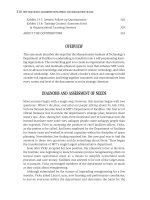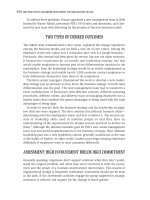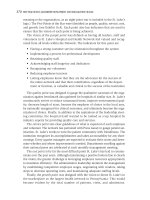Tài liệu Best Practives in Leadership Development & Organization Change 5 doc
Bạn đang xem bản rút gọn của tài liệu. Xem và tải ngay bản đầy đủ của tài liệu tại đây (160.99 KB, 10 trang )
Follow-Up with Key Stakeholders
The APEX program was grounded in the A4SL Coaching & Consulting research
regarding the impact of follow-up on perceived leadership effectiveness. In vir-
tually every organization in which A4SL C&C has delivered coaching services,
one lesson is universally the same: regular follow-up with key stakeholders
equates with perceived improvement in leadership effectiveness.
At least some of the Agilent executives who were seen as following up effec-
tively probably informed raters of their development objectives during the ini-
tial debrief of the 360-degree results. The initial debriefing is ideally a focused,
five- to ten-minute individual meeting held with each respondent immediately
after the 360-degree report is received. The follow-up addresses
• Thanking raters for providing anonymous 360-degree input
• Relating the positive feedback
• Disclosing the developmental goal(s)
• Enlisting the rater’s help in the participant’s developmental efforts
Having conducted this “initial debriefing,” APEX participants are encouraged
to follow up with raters at regular intervals (quarterly on average) to pursue
additional feedback on their improvement. Figure 1.3 provides some compelling
data demonstrating the difference in perceived improvement among those APEX
participants who followed up and those who did not.
MEASUREMENT: THE MINI-SURVEY PROCESS
APEX coaching includes up to two online mini-surveys (see Exhibit 1.3). In
addition to providing a clear insight into perceptions of behavioral change, these
mini-survey results are used to determine improvement for purposes of the
results-guarantee clause as well.
Mini-surveys are short, three- to five-item questionnaires completed by
a leader’s key stakeholders. Raters are asked to measure improvement in the
leader’s overall leadership effectiveness and specific areas for development.
Raters also indicate whether the leader has followed up with them regarding his
or her areas for development. Additional written comments are also requested.
Aside from verifying individual improvement, mini-survey data can be aggre-
gated to provide team, group, or corporate-level improvement data.
RESULTS
APEX results to date (as demonstrated by aggregated mini-survey data) are
impressive. Figure 1.1 depicts aggregate results regarding improvements in overall
leadership effectiveness. (Data originate from APEX as well as original SPG raters.)
10
BEST PRACTICES IN LEADERSHIP DEVELOPMENT AND ORGANIZATION CHANGE
cart_14399_ch01.qxd 10/19/04 11:25 AM Page 10
Question: Has this person become more or less effective as a leader
since the feedback session?
Scale: Ϫ3 “less effective” to ϩ3 “more effective”
N ϭ 831 raters
Seventy-three leaders
Nearly 57 percent of respondents felt that APEX leaders had improved in over-
all leadership effectiveness to a ϩ2orϩ3 level. Over 78 percent of respondents
felt that APEX leaders had improved to a ϩ1, ϩ2, or ϩ3 level. Nineteen percent
of respondents felt that leaders did not change, whereas nearly 3 percent felt
that leaders got worse.
Figure 1.2 depicts improvement in participants’ selected areas for develop-
ment. (Once again, the data originate from all APEX as well as original SPG
raters.)
Improvement on specific areas for development selected by leaders
Scale: Ϫ3 “less effective” to ϩ3 “more effective”
N ϭ 2276 raters
Seventy-three leaders
AGILENT TECHNOLOGIES, INC.
11
Figure 1.1 Aggregate Results for Overall Leadership Effectiveness.
Source: Data collected and managed by Assessment Plus.
23.7%
–3
0.0%
5.0%
10.0%
15.0%
20.0%
25.0%
30.0%
35.0%
–2 –1 0 1 2 3
0.6%
1.1%
1.0%
19.1%
21.6%
23.7%
32.8%
Less effective More effective
cart_14399_ch01.qxd 10/19/04 11:25 AM Page 11
Nearly 54 percent of respondents felt leaders improved in their selected devel-
opmental goals to a ϩ2 or ϩ3 level. Nearly 77 percent felt leaders improved to
a ϩ1, ϩ2, or ϩ3 level. Nearly 21 percent of raters did not perceive any change,
whereas 2 percent perceived leaders as getting worse.
Results for those leaders who followed up versus those who did not
(from APEX and the original SPG groups)
N ϭ 831 raters
Seventy-three leaders
Of the 831 raters, 530 (64 percent) believed leaders followed up with them ver-
sus 301 (36 percent) who perceived no follow-up. Nearly 67 percent of following-
up leaders were seen as improving to a ϩ2orϩ3 level, compared to 38 percent for
those who did not follow up. More notably, 35 percent of leaders who did not
follow up were perceived as staying the same (0) compared to nearly 11 percent
who did follow up. Over 5 percent of those who did not follow up were perceived
as getting worse, compared to 1.2 percent of the follow-up group.
In addition, positive feedback was frequently reported through the qualita-
tive remarks of the mini-surveys.
12
BEST PRACTICES IN LEADERSHIP DEVELOPMENT AND ORGANIZATION CHANGE
Figure 1.2 Aggregate Results for Selected Areas of Development.
Source: Data collected and managed by Assessment Plus.
23.7%
–3
0.0%
5.0%
10.0%
15.0%
20.0%
25.0%
30.0%
35.0%
–2 –1 0 1 2 3
0.7%
0.5%
1.6%
20.5%
22.8%
21.7%
32.2%
Less effective More effective
cart_14399_ch01.qxd 10/19/04 11:25 AM Page 12
AGILENT TECHNOLOGIES, INC.
13
Overall, APEX results to date have been very encouraging. Leaders are
improving in both overall leadership effectiveness and their selected areas for
development, as perceived by those working with the leaders.
KEY INSIGHTS AND LESSONS LEARNED
The following are some key insights and lessons learned from the APEX
experience that may enable any organization to more effectively implement an
executive coaching program:
Figure 1.3 Aggregate Results for Follow-up Versus No Follow-up.
Source: Data collected and managed by Assessment Plus.
34.5%
–3
1.0%
2.8%
1.7%
22.4%
21.1%
16.6%
34.5%
27.7%
0.4%
0.2%
0.6%
21.2%
10.5%
0.0%
5.0%
10.0%
15.0%
20.0%
25.0%
30.0%
35.0%
–2 –1 0 1 2 3
40.0%
45.0%
Less effective More effective
39.5%
39.5%
No follow-up Follow-up
cart_14399_ch01.qxd 10/19/04 11:25 AM Page 13
• Senior leadership commitment to APEX. In the last two years, from 2001 to
2003, the technology sector has suffered its worst downturn in recent history.
Agilent’s APEX program stands as a visible demonstration by senior leadership
of their continuing commitment to developing leaders by sponsoring execu-
tive and personal development even in a difficult market climate. Many “high-
profile” senior leaders were early APEX adopters, and they inspired many more
leaders to enroll in the program.
• Personal commitment of Agilent leaders. The majority of APEX participants
have displayed a high level of personal commitment to self-development as
displayed through their respective individual coaching partnerships. The APEX
program has experienced a very low percentage of participants becoming dis-
interested or dropping out; most participants enjoy favorable feedback from
mini-surveys administered at the program’s conclusion. The investments being
made in personal development pay dividends for most APEX participants over
time.
• Worldwide scope of APEX. A key challenge in the development of the pro-
gram was locating and retaining high-level coaches internationally who are will-
ing to work under the results-guarantee clause. Early difficulties have since been
overcome in developing an international network of qualified coaches willing
to work within the performance-guarantee clause. Prior to this, some coaches
traveled internationally to deliver APEX coaching services.
• APEX target audience. Since its inception, APEX has been and remains a
developmental tool targeting high-performing or high-potential Agilent execu-
tives. It is not intended to serve as a remedial process for an underperforming
executive or as a performance-assessment program. APEX candidates are first
screened by Agilent’s Leadership Development Group to ensure that APEX is a
good fit.
• Coach follow-up with feedback raters. APEX coaches keep in regular con-
tact with a leader’s key stakeholders. Coaches want to know whether the
leader’s new behaviors are being noticed by their raters. The only APEX assign-
ment to go full term without achieving successful results had a coach who was
out of touch with the raters and did not recognize their continual dissatisfac-
tion with the leader. Because raters are “customers” in the process, coaches reg-
ularly communicate with them.
• Coach mismatches. The possibility of coach mismatches appears to have
been addressed and minimized. Participants starting in the APEX program
receive biographies of up to four A4SL C&C coaches within their geographic
area. Executives then contact and screen from this set of prospective coaches,
and ultimately select their coach. By allowing executives to largely self-select,
the APEX experience has yielded very few mismatches. In those very few
instances in which a mismatch has surfaced, alternative coaches have been
made available.
14
BEST PRACTICES IN LEADERSHIP DEVELOPMENT AND ORGANIZATION CHANGE
cart_14399_ch01.qxd 10/19/04 11:25 AM Page 14
AGILENT TECHNOLOGIES, INC.
15
• Delivers superior market-driven performance
Focuses externally on the customer
Drives for results
Models speed
Models focus
Models innovation
• Practices active leadership
Leads people
Actively manages talent
Models accountability
Models trust, respect, and teamwork
Models uncompromising integrity
• Builds equity in the Agilent brand
Practices strategic portfolio management
Promotes a global brand
Creates a boundaryless organization
Exhibit 1.1. The Agilent Business Leader Inventory
• Delivers high-growth performance
Focuses externally on the customer
Drives for results
Models speed
Models focus
Models accountability
• Practices active leadership
Leads strategy and change
Actively develops self
Actively manages talent
Models uncompromising integrity
Models innovation
• Acts globally
Creates a global organization
Models trust, respect, and teamwork
Exhibit 1.2. The Agilent Global Leadership Profile
cart_14399_ch01.qxd 10/19/04 11:25 AM Page 15
16
BEST PRACTICES IN LEADERSHIP DEVELOPMENT AND ORGANIZATION CHANGE
Agilent Technologies Mini-Survey Follow-up to the 360-Assessment
Return Information:
You are rating Alison Jerden.
You are in the “PEERS” rater group.
Your Web ID is 434-211667.
You may take this survey online by going to . . .
/>or . . .
Fax this survey to 1.413.581.2791
or . . .
Mail this survey via traceable carrier (FedEx, UPS, etc.) to . . .
Assessment Plus
1001 Main Street
Stone Mountain, GA 30083-2922
YOUR FEEDBACK MUST BE RECEIVED BY AUGUST 09, 2000
If you have any questions, please call Alison Jerden at 1.800.536.1470
or email
Company Items
C1 Since the feedback session, has this person followed-up with you regarding
how he/she can improve?
1: No
2: Yes
C2 Do you feel this person has become more or less effective as a leader since
the feedback session? (Do not consider environmental factors beyond this
person’s control.)
Ϫ3: Less Effective
Ϫ2:
Ϫ1:
0: No Change
1:
2:
3: More Effective
N: No Information
Original 360 Survey Items
Please rate the extent to which this individual has increased/decreased in effec-
tiveness in the following areas of development during the past several months.
2. Distills market knowledge into meaningful trends and patterns
Ϫ3: Less Effective
Ϫ2:
Ϫ1:
0: No Change
1:
2:
3: More Effective
N: No Information
2a Do you feel that change was needed in the area mentioned in the previous
question?
1: No
2: Yes
Exhibit 1.3. Agilent Sample Mini-Survey
cart_14399_ch01.qxd 10/19/04 11:25 AM Page 16
AGILENT TECHNOLOGIES, INC.
17
14 Effectively communicates higher organization’s vision
–3: Less Effective
–2:
–1:
0: No Change
1:
2:
3: More Effective
N: No Information
14a Do you feel that change was needed in the area mentioned in the previous
question?
1: No
2: Yes
30 Openly shares information
–3: Less Effective
–2:
–1:
0: No Change
1:
2:
3: More Effective
N: No Information
30a Do you feel that change was needed in the area mentioned in the previous
question?
1: No
2: Yes
You are rating Alison Jerden
Comments
What has been done in the past several months that you have found to be
particularly effective?
What can this person do to become more effective as a manager in the
development areas noted above?
Exhibit 1.3. (Continued)
cart_14399_ch01.qxd 10/19/04 11:25 AM Page 17
18
BEST PRACTICES IN LEADERSHIP DEVELOPMENT AND ORGANIZATION CHANGE
ABOUT THE CONTRIBUTORS
Brian O. Underhill is a senior consultant and coach with Alliance for Strategic
Leadership Coaching & Consulting, specializing in leadership development and
multi-rater (360 degree) feedback, executive coaching, and organizational cul-
ture. Brian designs and implements large-scale, results-guaranteed, executive
coaching programs at multiple organizations. His executive coaching work has
successfully focused on helping clients achieve positive, measurable, long-term
change in leadership behavior. His clients have included Agilent Technologies,
AT&T, California Public Employees Retirement System (CalPERS), Federal Avi-
ation Administration (FAA), Johnson & Johnson, Sun Microsystems, and Warner
Lambert. Brian has a Ph.D. and a M.S. degree in organizational psychology from
the California School of Professional Psychology (Los Angeles).
Dianne Anderson is committed to helping individuals and organizations
achieve learning, change, and growth. In her current position as global program
manager for Agilent Technologies, Inc., she is responsible for all global execu-
tive coaching programs, and for learning and organizational effectiveness con-
sulting to one of Agilent’s business units. Dianne’s career includes leadership
positions and operational experience in worldwide marketing for Hewlett-
Packard (HP), as well as positions in R&D. Dianne’s seventeen-plus years of
operating experiences have prepared her to develop the skills, knowledge, and
abilities of senior management so they can more effectively compete in the
global marketplace. Over her career she has managed complex organizations
with multi-million dollar budgets, with experience in line and staff positions at
the business unit and corporate levels, and had responsibility for building key
marketing and sales capabilities.
Robert A. Silva, since January 2002, has served as head of the coaching practice
area for A4SL Coaching & Consulting, a consulting group based in San Diego
that specializes in leadership development. Prior to his current role, Bob served
as one of the seven directors of Keilty, Goldsmith & Company from 1987 to 2001.
Bob’s business background includes experience in the investment field with
Paine, Webber in Boston, and fourteen years in sales management with Min-
nesota Mining & Manufacturing Company in New England. During his fifteen
years as a consultant and coach, Bob has focused on the design and delivery of
training to promote leadership development, organizational values, and team
effectiveness. Bob’s primary emphasis since the mid-1990s has been in the area
of executive coaching, helping leading organizations succeed by enhancing the
leadership effectiveness of key individuals.
Karen Walker is the director of client solutions for Assessment Plus and directs
the data services for the Agilent programs. Assessment Plus is an Atlanta-based
cart_14399_ch01.qxd 10/19/04 11:25 AM Page 18
consulting firm specializing in web-based assessments to maximize results from
leadership, team, and organizational effectiveness programs. Karen teaches a
360 Feedback Certification course for Corporate Coach University and a work-
shop on Best Practices for Implementing 360 Programs through the Cornell Uni-
versity School of Industrial and Labor Relations. Some of Karen’s organizational
survey clients include Acushnet, Cox Enterprises, Lend Lease, Marsh, Porsche,
Vicinity, and Consumer Credit Counseling Services. Karen coaches executives
taking part in leadership assessment programs for organizations including the
American Cancer Society, Citigroup, Lockheed Martin, Akzo Nobel, BMW,
Kodak, and Sun Microsystems. Karen has a degree in Industrial and Systems
Engineering from the Georgia Institute of Technology and completed her Ph.D.
in Counseling Psychology at the University of Georgia.
AGILENT TECHNOLOGIES, INC.
19
cart_14399_ch01.qxd 10/19/04 11:25 AM Page 19









